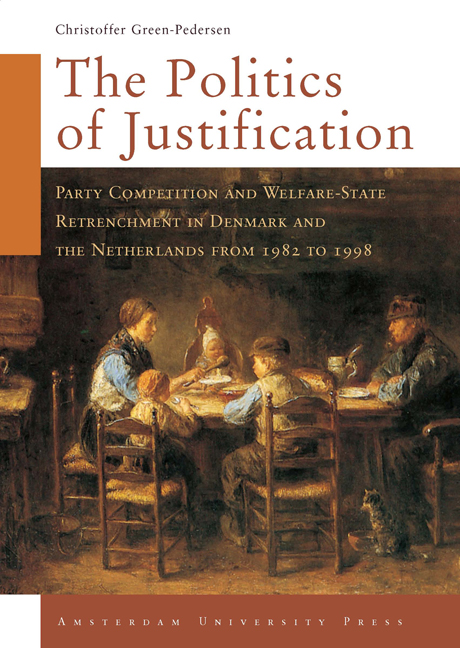 The Politics of Justification
The Politics of Justification Book contents
- Frontmatter
- Acknowledgments
- Contents
- List of Abbreviations
- 1 Introduction
- 2 From Theories of Expansion to Theories of Retrenchment
- 3 Framework for Government Choice on Retrenchment
- 4 Research Strategy and Research Design
- 5 Retrenchments in Denmark and the Netherlands
- 6 Dutch Politics and Welfare-State Retrenchment.How Party Competition Produced Consensus
- 7 Danish Politics and Welfare-State Retrenchment:The Difficulties of a Right-Wing Government and the Possibilities of a Left-Wing Government
- 8 The Evidence on Balance and some Quibbles
- 9 Party Politics Matter – Summary and Implications
- Appendix
- Summary
- Notes
- References
- Index
8 - The Evidence on Balance and some Quibbles
Published online by Cambridge University Press: 15 January 2021
- Frontmatter
- Acknowledgments
- Contents
- List of Abbreviations
- 1 Introduction
- 2 From Theories of Expansion to Theories of Retrenchment
- 3 Framework for Government Choice on Retrenchment
- 4 Research Strategy and Research Design
- 5 Retrenchments in Denmark and the Netherlands
- 6 Dutch Politics and Welfare-State Retrenchment.How Party Competition Produced Consensus
- 7 Danish Politics and Welfare-State Retrenchment:The Difficulties of a Right-Wing Government and the Possibilities of a Left-Wing Government
- 8 The Evidence on Balance and some Quibbles
- 9 Party Politics Matter – Summary and Implications
- Appendix
- Summary
- Notes
- References
- Index
Summary
This chapter aims at two things. First, at briefly summarising the results of both parts of the empirical investigation. This will be done by discussing each of the six hypotheses developed in chapter 4. Second, a number of possible quibbles and alternative explanations will be discussed. Chapter 2 presented a number of theoretical propositions about variation in welfare-state retrenchment. The general aim of the research design was to be able to rule out such alternative explanations. However, this was as always only possible to some extent, leaving a number of plausible alternative explanations that deserve discussion.
The empirical support for the framework on balance
The first hypothesis was that there would be no sweeping retrenchment. Chapter 5 revealed support for this hypothesis with the qualification that defining ‘sweeping’ is difficult indeed. The underlying argument was the idea of the politics of retrenchment as one of blame avoidance. The Danish as well as the Dutch case supported this idea. In both countries, retrenchment proposals were met with demonstrations and protests. Several of the governments also experienced electoral punishment for retrenchment. However, both cases also demonstrated that governments are not necessarily punished for retrenchment.
The second of the six hypotheses suggested the implementation of more retrenchment in the Netherlands than in Denmark, based on the different systems of party competition. This hypothesis was confirmed in chapter 5 and chapter 7 showed that a consensus on retrenchment policy did in fact not emerge in Denmark until after the Social Democrats regained power in 1993. As long as they were in opposition, they had no incentive to give up their ownership of the welfare-state issue by engaging in welfare-state retrenchment. The Dutch case demonstrated how the pvda was ‘forced’ to abandon its ownership of the welfare-state issue through the 1980's to become an acceptable government partner for the cda. Thus, it does seem that the different systems of party competition can explain the variation between the two cases. However, it goes without saying that the framework cannot explain all the details in the party competition surrounding retrenchment. In the Dutch case, the framework would have, for instance, predicted the PVDA to choose a centrist course more rapidly than the party in fact did, and it is also surprising that the cda gave away part of its pivotal power when it declared the VVD its preferred government partner before the 1986 election.
- Type
- Chapter
- Information
- The Politics of JustificationParty Competition and Welfare-State Retrenchment in Denmark and the Netherlands from 1982 to 1998, pp. 131 - 142Publisher: Amsterdam University PressPrint publication year: 2002


